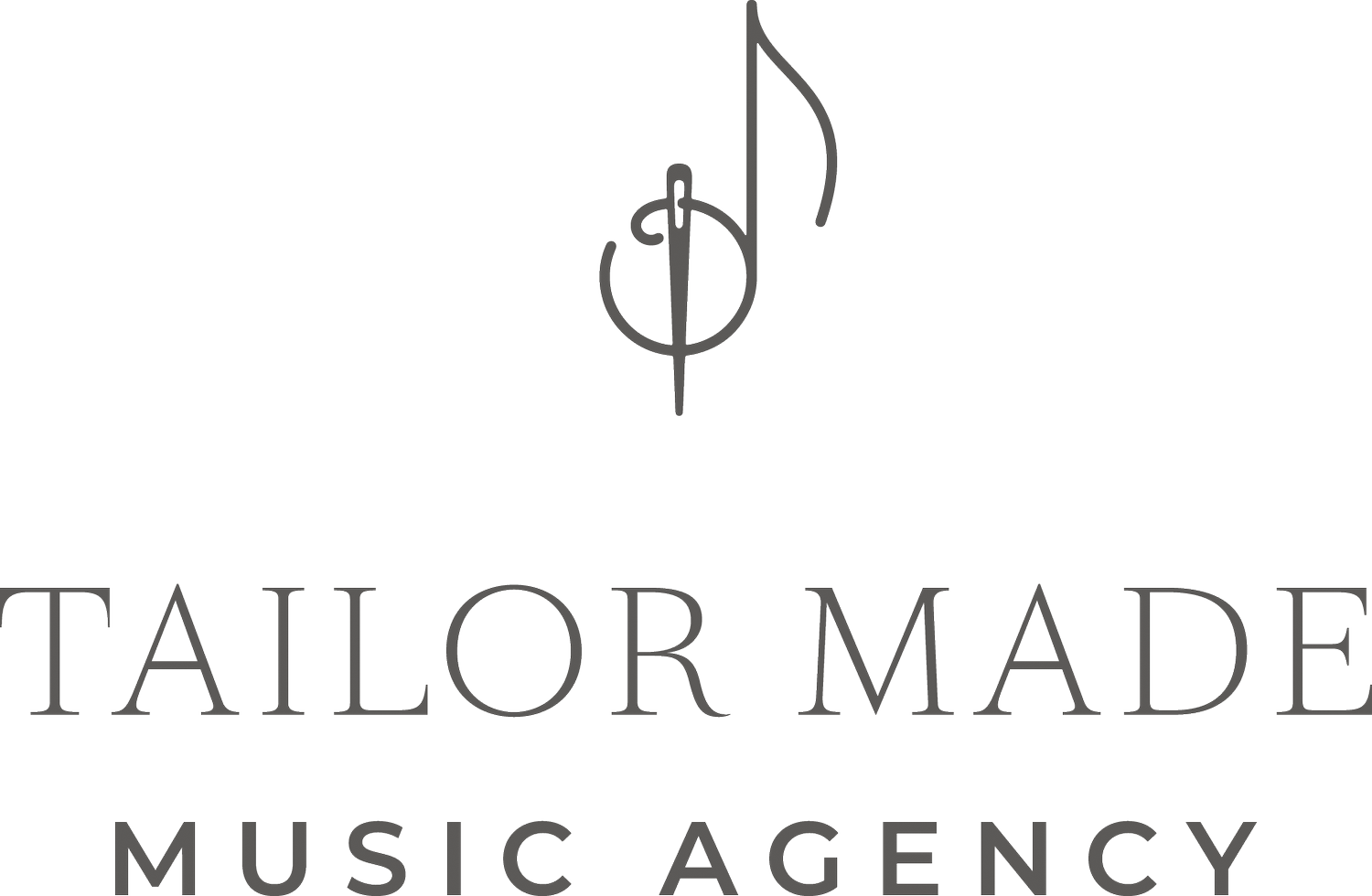I can’t stress enough how important it is to have a properly written contract with all your wedding suppliers! A contract ensures everyone knows exactly what to expect from one another. And in the unlikely event that something goes wrong, it makes sure both you and the suppliers get treated fairly.
My contracts are more thorough than most. That’s one of the benefits of using a music agency to book your wedding musicians. I have an extra duty of care to look after both you and the musicians. All the things listed below are in my contracts, and in my opinion, should be in ALL wedding music contracts!
1. The wedding date
This one’s fairly obvious!
2. The full name and address of the venue(s)
If your venue is difficult to find or doesn’t have a formal address (e.g. if it’s in the middle of the countryside), it’s helpful to include the nearest postcode and brief directions as well.
3. Timings
The contract should include the time you expect your musicians to start and finish playing. Setting up and packing away takes place outside of those times.
If there are other specific details, for example, the start time of your ceremony, the contract should list those too.
I don’t usually include break times on the contract, as musicians need the freedom to adapt on the day. Though if you want them to take a break at a specific point, such as during the speeches, that should be detailed. It’s worth remembering that wedding days rarely run exactly as planned, so make sure you leave some room for flexibility!
4. The size and line-up of the ensemble you’ve booked
These affect the price, so they need to be specified to make sure you get what you’ve paid for.
Some line-ups might be flexible, particularly jazz ensembles. For example, “jazz trio” could be any three jazz instruments. If a couple has chosen specific instruments, I will detail that on the contract.
5. The name of the musician or ensemble you’ve booked
My contracts are between you (the client) and the musicians (the artist), with me as an intermediary. Aside from in an emergency (more on that below), the named artist can’t be swapped for another musician or ensemble. That would be a breach of contract. This means the musician or ensemble you’ve chosen will definitely be the one who turns up on the day. Unfortunately, that isn’t always the case with some other wedding musicians and agencies.
Some of my ensembles do have a more flexible line-up, meaning they don’t always play with the exact same group of people. In that case, you might only get the name of the lead player listed on the contract. But if you have your heart set on a particular musician (which often happens when couples see my artists’ promo videos!) I can make sure that person is named in the contract.
6. Song choices and when they’re to be played
Any songs choices you’ve made in advance should be detailed on the contract. It should also say when you want each song played. For example:
“Ceremony entrance music: Pachelbel Canon in D”
You don’t have to decide on all your song choices at the point of contracting – you can pick them nearer the time. But if there’s already a song you’re sure of, you won’t be disappointed as long as it’s in the contract.
7. The style or genres of music you want
For background music, you don’t need to specify an entire setlist. The musicians have lots of experience of what works best in different settings, so it’s usually best left to them. But you might want to ask for certain types of music. For example, “all classical” or “a mixture of Latin jazz and jazz standards”.
8. Details of equipment and things you need to provide
This includes things like how many chairs the musicians need, how much space, and if they require access to the power supply. It’s really the venue that provides these things. But since you’re likely to be the one who has a contract with the venue, you’re responsible for making those requests.
It might also include refreshment requests. I usually ask for soft drinks to be provided, and a light meal or sandwiches if the booking is over 2 hours. This is pretty standard for wedding suppliers and makes sure your musicians can perform at their best!
9. Details of equipment and things the artist needs to provide
Besides the things mentioned above, my contracts assume that the artist will provide everything else they need. I always specify whether amplification is required. But it’s down to the artist to know exactly what amplifiers, cables, microphones etc. to bring. You don’t need to worry about any of that!
10. A plan for different weather conditions
If any part of your booking is taking place outdoors, I’ll discuss a plan with you for different weather conditions. I’ll detail that on the contract. There’s more on that in my previous blog post: 6 things you need to know about having live music at an outdoor wedding ceremony.
11. Attire
My standard line is “smart, formal wear”. But you might want your musicians to wear something particular, for example, specific colours, or more casual clothes. We can discuss that and put it in the contract.
12. Permission to film your wedding musicians
If you plan to have a wedding videographer, this bit is important. A musician will want to have control over the use of any footage. As an example, they might be okay with you filming it for personal use, but not with the videographer publishing it for commercial gain. Or they might agree to it going on social media, providing they are credited.
For these reasons, filming or recording needs to be agreed upon in advance and written in the contract.
13. Payment details
Your contract should detail the total amount you need to pay. Also, what date it is due, and the payment methods available!
14. What the cancellation policy is
A contract is legally binding. So if either you or the musician try to cancel, you won’t be able to do so without penalty. You must read the cancellation policy carefully and agree to it before signing. It’s there to protect both you and the musician and to make sure everyone is treated fairly.
15. What happens if something needs to change ahead of the day
If you’re booking wedding musicians far in advance, small changes are inevitable. The most common one is timings. If a couple isn’t 100% sure on timings at the time of booking, I will usually put: “to be confirmed no less than 3 months before the booking date”.
If you do need to make changes – even big ones – as long as they’re agreed in writing between all parties, there’s no problem. If we can’t get an agreement, we’ll work towards a compromise that works for everyone. Again, that’s another benefit of having a booking agent to mediate for you!
16. What happens if something needs to change on the day
If something goes awry on the day, you need to know your musicians can handle it. Although this isn’t ideal, my contracts allow you to negotiate directly with the artists to find a solution. So, for example, if your timings go entirely out the window, you can have a conversation about overtime without needing to contact the agent.
Again, both parties need to agree, and the request needs to be reasonable. The artist may request extra payment, and the client should be prepared to pay this by cash or cheque on the day.
17. What happens if there’s a serious problem
In the unlikely event something goes wrong that’s out of anyone’s control, your contract should detail what happens in those situations. Also, who’s responsible for finding a solution. In most cases, that’s me – another great benefit of having a booking agent!
The most common problem (although thankfully still unusual) is that one member of an ensemble gets ill and can’t perform. Every musician has a network of deputies they can call upon at short notice, so there will always be a solution. And importantly, my contracts stipulate that deputies must be of an equal standard to the musician they’re replacing. So, there’s no compromise in the performance quality.
18. All the necessary contact details
Your contract should list:
Your contact details
The agent’s contact details
The artist’s contact details (although in my case, I pass these on to you 6 weeks before the wedding)
An emergency contact for the day. This can be a wedding planner, venue coordinator or a member of the wedding party. (We can also add this nearer the time)
Hopefully, this blog post has shown you all the things to look out for in your wedding music contract and the reasons why they’re all so important. A good contract will avoid a lot of stress and heartache on all sides if anything does go wrong.








